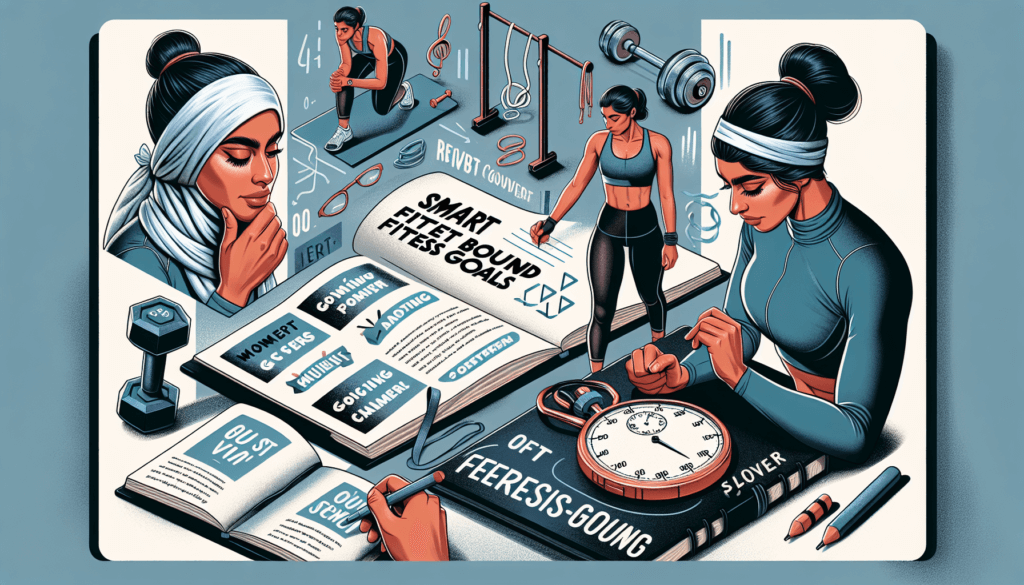So, you’ve decided it’s time to get fit and fabulous, but you’re not sure where to start. Don’t worry, we’ve got you covered! In this article, we’ll explore the key steps to setting and achieving your fitness goals. Whether you’re a newbie in the fitness world or someone who wants to up their game, we’ll guide you through the process of defining clear goals and creating a plan of action. So grab your water bottle and get ready to embark on a journey towards a healthier, happier you!

Define Your Fitness Goals
Setting clear and specific fitness goals is crucial in order to stay focused and motivated on your fitness journey. By defining your goals, you will have a clear picture of what you want to achieve and can work towards it effectively.
Identify the Specificity of Your Goals
When setting fitness goals, it’s important to be as specific as possible. Instead of saying, “I want to lose weight,” specify how much weight you want to lose and by when. This will help create a clear target to work towards.
Set SMART Goals
SMART goals are Specific, Measurable, Achievable, Relevant, and Time-bound. This framework helps ensure that your goals are well-defined and attainable. For example, a SMART goal could be “I want to lose 10 pounds in 3 months by following a healthy diet and exercising three times a week.”
Determine Your Timeline
Having a timeline for your fitness goals allows you to stay on track and monitor your progress. It gives you a sense of urgency and helps you prioritize your efforts. Determine how long it will realistically take to achieve your goals and set milestones along the way to keep yourself motivated.
Create a Plan of Action
Once you have defined your fitness goals, it’s time to create a plan of action to help you achieve them. This plan will outline the steps you need to take in order to reach your goals and ensure that you have a structured approach to your fitness journey.
Assess Your Current Fitness Level
Before you start any fitness program, it’s important to assess your current fitness level. This will give you an understanding of your strengths and weaknesses and help you design a personalized workout routine that suits your capabilities.
Consult with a Fitness Professional
Seeking guidance from a fitness professional, such as a personal trainer, can greatly benefit your fitness journey. They can provide you with expert advice, design a workout program tailored to your goals, and ensure that you exercise safely and effectively.
Choose Suitable Exercise Methods
Consider the types of exercises that align with your goals and preferences. Whether it’s cardiovascular exercises, strength training, or a combination of both, choosing the right methods will help you stay motivated and engaged in your workouts.
Design a Balanced Workout Routine
Creating a balanced workout routine is essential to ensure that you target all areas of fitness, including cardio, strength, and flexibility. Incorporate a variety of exercises into your routine to challenge different muscle groups and prevent boredom.
Consider Cross-training
Cross-training involves combining different types of activities in your fitness routine. This not only helps prevent overuse injuries but also adds variety and keeps your workouts exciting. Mix up your routine by including activities like swimming, cycling, or yoga.
Establish Regular Exercise Frequency
Consistency is key when it comes to achieving your fitness goals. Set a regular exercise schedule that is realistic and achievable for you. Whether it’s three times a week or five, committing to regular exercise will help you make steady progress towards your goals.

Track Your Progress
Tracking your progress is essential for staying motivated and monitoring your achievements. By keeping track of your workouts, measurements, and other fitness indicators, you can see how far you’ve come and make adjustments to your plan as needed.
Use Fitness Apps or Wearable Devices
Fitness apps and wearable devices provide a convenient way to track your workouts, monitor your heart rate, count your steps, and more. These tools can help you stay motivated by providing real-time feedback and visualizing your progress.
Keep a Workout Journal
Keeping a workout journal allows you to record your workouts, track your progress, and make notes about how you feel during and after each session. This can provide valuable insights into what works for your body and help you make informed decisions about your fitness routine.
Monitor Fitness Indicators
Measurements such as body weight, body fat percentage, and muscle mass can be useful indicators of progress. By regularly tracking these measurements, you can see changes over time and adjust your goals or actions accordingly.
Take Progress Photos
Progress photos can be a powerful tool to visually see your transformation. Taking pictures at regular intervals, such as monthly or every few months, allows you to compare and appreciate the changes in your body.
Stay Motivated
Staying motivated is crucial to maintaining consistency and achieving your fitness goals. Here are some strategies to keep you focused and on track:
Set Short-term Benchmarks
In addition to your long-term goals, setting short-term benchmarks can provide a sense of achievement and keep you motivated. Breaking down your goals into smaller, manageable steps allows you to celebrate milestones along the way.
Reward Yourself
Rewarding yourself for reaching milestones or sticking to your workout routine can be a great way to stay motivated. Treat yourself to something you enjoy, such as a massage, a new workout outfit, or a day off from your regular routine.
Find an Accountability Partner
Having someone to hold you accountable can significantly increase your motivation. Find a workout buddy or a friend who also has fitness goals and commit to supporting and encouraging each other on your fitness journeys.
Join a Fitness Community
Being part of a fitness community can provide a sense of belonging and support. Whether it’s a local fitness group, an online forum, or social media groups, surrounding yourself with like-minded individuals can inspire and motivate you.
Practice Positive Self-talk
The way you talk to yourself matters. Replace negative self-talk with positive affirmations and remind yourself of your progress and capabilities. Believe in yourself and your ability to achieve your goals.
Visualize and Affirm Your Success
Engaging in visualization techniques can help you envision yourself achieving your fitness goals. Imagine how it feels, looks, and sounds to be where you want to be. Affirmations also play a powerful role in reinforcing positive beliefs and attracting success.

Adopt Healthy Lifestyle Habits
Fitness is not just about exercise – it’s about adopting a holistic approach to your overall well-being. Here are some important lifestyle habits to incorporate into your fitness journey:
Prioritize Sleep and Rest
Adequate sleep and rest are crucial for recovery and overall health. Make sleep a priority by establishing a consistent sleep schedule and creating a sleep-friendly environment. Allow yourself rest days to let your body recover and prevent burnout.
Maintain a Balanced Diet
A balanced diet is essential for fueling your body and supporting your fitness goals. Ensure that you’re eating a variety of nutrient-dense foods, including fruits, vegetables, lean proteins, whole grains, and healthy fats. Avoid crash diets and focus on sustainable, long-term eating habits.
Stay Hydrated
Proper hydration is essential for optimal performance and overall health. Aim to drink enough water throughout the day, especially during and after exercise. Listen to your body’s thirst cues and avoid sugary drinks or excessive caffeine.
Avoid Excessive Stress
High levels of stress can negatively impact your overall well-being and hinder your progress. Find healthy ways to manage stress, such as practicing relaxation techniques, engaging in hobbies, or seeking support from loved ones. Incorporate stress-reducing activities, such as yoga or meditation, into your routine.
Manage Your Time Wisely
Finding time for exercise and self-care can be challenging, especially with a busy schedule. Prioritize your time by setting aside dedicated blocks for exercise and meal preparation. Look for ways to maximize your time, such as multitasking or finding efficient workout routines.
Limit Sedentary Behavior
Prolonged sitting can have detrimental effects on your health, even if you exercise regularly. Find opportunities to incorporate movement throughout your day, such as taking breaks to stretch or walk, using a standing desk, or participating in active hobbies.
Overcome Challenges
Challenges are a natural part of any fitness journey, but with the right mindset and strategies, you can overcome them and keep moving forward.
Identify Potential Obstacles
Recognize the potential challenges that may arise on your fitness journey. Whether it’s lack of time, injuries, or temptations, being aware of these obstacles allows you to plan ahead and develop strategies to overcome them.
Develop Strategies to Overcome Setbacks
When setbacks occur, it’s important to stay resilient and adapt. Instead of giving up, develop strategies to overcome setbacks. Modify your workout routine, seek alternative exercises, or consult with a professional for guidance. Remember that setbacks are temporary, and you have the power to bounce back.
Seek Support and Guidance
Don’t be afraid to ask for help when needed. Reach out to a fitness professional, seek support from friends and family, or join online communities for guidance and motivation. Having a support system can make a significant difference in your ability to overcome challenges.
Stay Flexible and Adapt
Flexibility is key when it comes to achieving your fitness goals. Be open to adjusting your goals, workout routine, or strategies as you progress and encounter new situations. Embrace change and adapt to ensure your fitness journey remains enjoyable and sustainable.

Celebrate Milestones
Celebrating milestones along your fitness journey is important to acknowledge your achievements and maintain motivation.
Acknowledge and Celebrate Achievements
Take time to acknowledge and celebrate the progress you’ve made. Whether it’s reaching a weight loss milestone, increasing your strength, or completing a challenging workout, celebrate your achievements as a reminder of your hard work and dedication.
Set New Goals or Progressions
As you achieve your goals, it’s important to set new ones to continue challenging yourself and progressing. Setting new goals keeps you motivated and ensures that your fitness journey remains dynamic and exciting.
Reward Yourself Appropriately
Reward yourself when you reach significant milestones or accomplish a new goal. Treat yourself to something that aligns with your healthy lifestyle, such as a spa day, a new fitness gadget, or a healthy cooking class.
Stay Safe and Avoid Injuries
Safety should be a top priority in any fitness journey. Taking precautions and listening to your body will help prevent injuries and ensure a sustainable and enjoyable experience.
Warm Up and Cool Down Properly
Prior to any workout, make sure to warm up dynamically to increase blood flow and prepare your body for exercise. After your workout, cool down with static stretching to help prevent muscle soreness and promote recovery.
Use Correct Form and Techniques
Perform exercises with proper form and technique to prevent injuries and maximize the benefits. If you’re unsure about how to perform a specific exercise, consult with a fitness professional or seek instructional videos online.
Listen to Your Body
Pay attention to your body’s signals and avoid pushing yourself beyond your limits. If you experience pain, discomfort, or fatigue, modify your workout or take a rest day. It’s important to strike a balance between pushing yourself and respecting your body’s limits.
Gradually Increase Intensity
Gradually increase the intensity and duration of your workouts to avoid overexertion. Pushing yourself too hard too soon can lead to injuries and burnout. Follow a progressive training plan that allows your body to adapt and recover.
Avoid Overtraining
Overtraining occurs when you push your body beyond its ability to recover. This can lead to decreased performance, fatigue, and increased risk of injury. Listen to your body’s signals and incorporate rest days and active recovery exercises into your routine.
Recover and Rest as Needed
Rest and recovery are essential for muscle repair and growth. Make sure to include rest days in your workout schedule and prioritize quality sleep to allow your body to recover and recharge.
Seek Professional Guidance
Seeking professional guidance can provide you with the expertise and support needed to achieve your fitness goals safely and effectively.
Consult with a Certified Personal Trainer
Working with a certified personal trainer can greatly benefit your fitness journey. They can assess your fitness level, design personalized workout programs, and provide guidance and motivation throughout your journey.
Visit a Registered Dietitian for Nutrition Advice
Nutrition plays a vital role in achieving and maintaining your fitness goals. Consulting with a registered dietitian can help you develop a balanced and sustainable eating plan tailored to your goals and dietary needs.
Consider Working with a Sports Medicine Specialist
If you have specific concerns or pre-existing conditions, consulting with a sports medicine specialist can provide valuable insights and personalized advice. They can help you navigate any potential challenges and ensure that your exercise routine is safe and appropriate.
Get Regular Check-ups
Regular check-ups with your healthcare provider can ensure that you’re in good health and identify any potential issues that may impact your fitness journey. It’s important to address any concerns or symptoms promptly.
Maintain Long-term Commitment
Fitness is a lifelong journey, and maintaining long-term commitment is essential to achieving sustainable results.
Embrace a Positive Mindset
A positive mindset is crucial for long-term success. Believe in yourself and your ability to achieve your goals. Stay focused on the positive aspects of your journey and remember that setbacks are temporary and part of the process.
Make Fitness a Priority
Incorporate fitness into your lifestyle and make it a priority. Schedule your workouts, plan your meals, and prioritize self-care. By making fitness a part of your daily routine, it becomes easier to maintain your commitment in the long run.
Adapt Your Goals as Needed
As you progress on your fitness journey, your goals may evolve. Be open to shifting your focus, changing your goals, or exploring new areas of fitness. Adapting your goals allows you to stay engaged and continue challenging yourself.
Enjoy the Journey
Remember to enjoy the process and have fun along the way. Celebrate small victories, try new activities, and appreciate the benefits that regular exercise and a healthy lifestyle bring to your overall well-being. Enjoying the journey will make it easier to maintain long-term commitment.


